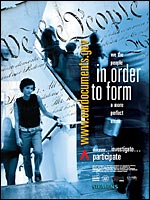talking history | syllabi | students | teachers | puzzle | about us
Our Documents: A National Initiative on American History, Civics, and Service
http://www.ourdocuments.gov/index.php?flash=false&.
A cooperative effort between National History Day and the National Archives and Records Administration.
Reviewed Sept. 30, 2003.
Cosponsored by National History Day and the National Archives, Our Documents is a web site that is designed to encourage “all Americans to participate in a series of events and programs to get us thinking, talking and teaching about the rights and responsibilities of citizens in our democracy.” Showcased are “100 milestone documents”—from Richard Henry Lee’s resolution for independence in 1776 to the Voting Rights Act of 1965. Each document is accompanied with a brief introduction, along with links to various instructional resources. In a rather farfetched attempt to give visitors a sense of what historians actually experience when they first encounter primary source material in the archives, these documents appear online in their original form.
Although slickly designed and easy to navigate, Our Documents will be of limited use to students and citizens.
First, the selection of documents is greatly constrained by the site’s overwhelming emphasis on the legal, political, and diplomatic history of the United States. Included here are 6 Supreme Court decisions, 24 presidential speeches or orders, 44 legislative acts, 20 treaties or international declarations, and 5 documents dealing with important inventions (from the cotton gin to the nuclear bomb). Even the most casual observer of history knows that court rulings, treaties, and legislation are not the stuff of elegant or powerful prose. These documents are all important, but it is hard to imagine that they could inspire anyone to become passionate about American history (or democracy).

Whose ‘We, the People,’ President Bush?
But it’s not just that this stuff is boring; it also does not reflect, as the site promises, “our diversity, our unity.” Of the 100 documents selected here, only one—the Official Program of the 1963 March on Washington—could be attributed to a person of color (unless you count the Surrender of the Japanese after World War II). Not a single document is authored by a woman. Although these documents deal with some of the major themes of U.S. history—slavery and civil rights, westward expansion, the rise of industrial capitalism, and America’s increasing power abroad—by treating African Americans, women, Native Americans, immigrants, gays and lesbians, and workers as mere subjects of history, rather than as historical agents in their own right, this collection is embarrassingly retrograde. Even the abolition of slavery—one of American democracy’s greatest triumphs—is presented here as mostly the work of Abraham Lincoln rather than the thousands of abolitionists, black and white, who for decades risked their careers and lives to redeem America from its “original sin.”
And this brings us to the real trouble with Our Documents: its failure adequately (or honestly?) to contextualize the major texts it includes. Incredibly, while the Web site claims that its hundred milestone documents reflect “our commitment as a nation to continue to strive to ‘form a more perfect union,’” the most important social movements in United States history—abolitionism, women’s rights, labor struggles, civil rights—are almost entirely absent here. It is as if the designers of Our Documents would have us believe that American institutions correct themselves all on their own. Students deserve better. They need to know that the promises of freedom and equality that lie at the very heart of American democracy have rarely been given freely or distributed equally; most of the time, they have had to be demanded and taken.
Timothy Patrick McCarthy
University of North Carolina
Chapel Hill, North Carolina
John McMillian
Harvard University
Cambridge, Massachusetts
